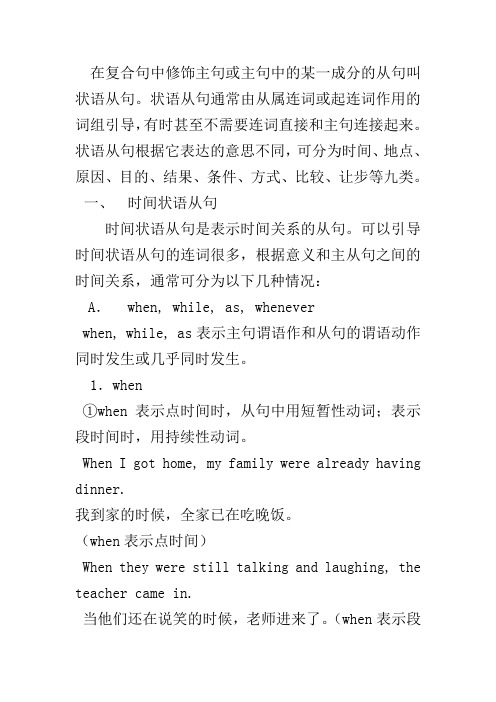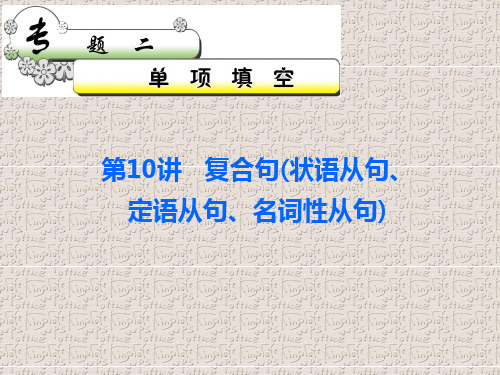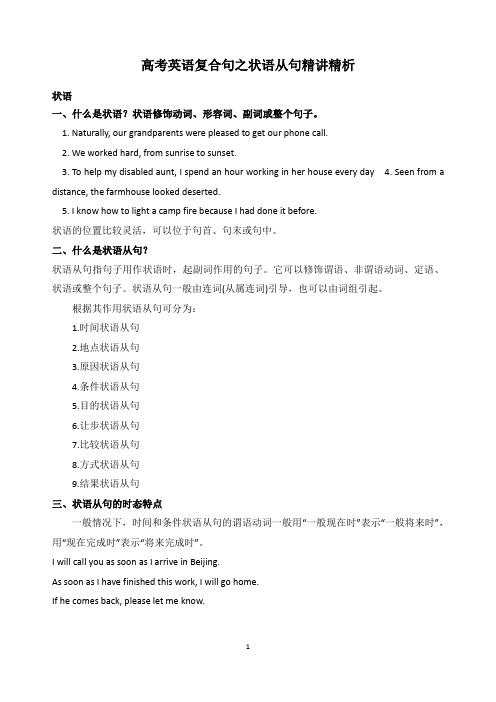(九) 复合句——状语从句
完整版英语语法状语从句的归纳总结

在复合句中修饰主句或主句中的某一成分的从句叫状语从句。
状语从句通常由从属连词或起连词作用的词组引导,有时甚至不需要连词直接和主句连接起来。
状语从句根据它表达的意思不同,可分为时间、地点、原因、目的、结果、条件、方式、比较、让步等九类。
一、时间状语从句时间状语从句是表示时间关系的从句。
可以引导时间状语从句的连词很多,根据意义和主从句之间的时间关系,通常可分为以下几种情况:A.when, while, as, wheneverwhen, while, as表示主句谓语作和从句的谓语动作同时发生或几乎同时发生。
1.when①when表示点时间时,从句中用短暂性动词;表示段时间时,用持续性动词。
When I got home, my family were already having dinner.我到家的时候,全家已在吃晚饭。
(when表示点时间)When they were still talking and laughing, the teacher came in.当他们还在说笑的时候,老师进来了。
(when表示段时间)He waved a hello when he saw her.当他看见她的时候,就挥手打了个招呼。
(when表示点时间)When you think you know nothing, you begin to know something.当你认为自己一无所知的时候,就开始知道一些事情了。
(when表示段时间)注意:当when意思是正当……时候(and at that moment)时,when只能跟在前一分句之后。
He was about to go to bed when the doorbel rang. 他正要上床,忽然门铃响了。
They were watching the World Cup when suddenly the lights went out.他们正看着世界杯比赛,突然灯灭了。
复合句(状语从句、定语从句、名词性从句)

4. while从句的谓语动词不可以是短暂性的。
考点归纳2:时间、条件状语从句的时态一致性 1. 句型“It will be+段时间+before从句”,表示 “不久 …… 就 ……”。从句用一般现在时代替一般将来 时。
2. 句型“It is+段时间+since+一般过去时。”主 句常用现在完成时,从句常用一般过去时。若从句谓语 动词是延续性的,表示动作的终止;若从句谓语动词是 短暂性的,则表示动作的开始。
【解析】B 题意:2011年4月29日,威廉王子和凯特· 米德尔顿步入了他们的婚礼殿堂。先行词是表示时间 的名词,定语从句缺少状语,所以用 when 引导。 that 在从句中不能作状语; since 与 before 不能引导定语从 句。
例 2 : (2011· 江 西 卷 )Please call my secretary to arrange a meeting this afternoon, or ______ it is convenient to you. A. whenever C. whichever B. however D. wherever
【解析】D 他的字迹模糊不清,以至于很难弄清他 到底在试图表达什么。所选项引导 make out后的宾语 从句,并在从句中作表语,故用what。
【小结】
状语从句是近几年高考常考的内容之一。主要考 查时间状语从句,地点状语从句,原因状语从句,结 果状语从句,目的状语从句,条件状语从句和让步状 语从句。很少考查方式状语从句。
考点归纳2:关系代词与关系副词的选用 如果先行词是时间、地点或理由,而引导词在从 句中作时间、地点、原因等状语时,引导词用 when, where, why;有时尽管先行词是时间、地点或 理由,但是引导词在从句中不作状语,而是作主语、 宾语或表语,引导词则用that或which。
2024年人教版中考英语语法课件:状语从句知识点归纳

Wherever my sister visits, she will send me a postcard. =No matter where my sister visits, she will send me a postcard.
as
当.....时, 一边...一边...
强调主从句动作同时进行
I saw the sun as I opened the window.
1、时间状语从句
2、until/ till 引导词: ① until和till意为“直到”,很多时候可以互换,但是用于句首的时候,常用until。 Until you get back, I will sit here.
3、让步状语从句
(表示主句中的某一动作或状态与从句中的某一动作或状态在意义上有部分矛盾。) 1、although/though 引导词: although/though意为“尽管,虽然”,不与but连用,但可用yet/ still. Although/ though he works hard, yet he makes slow porgress.
③ She is such a beautiful girl that everybody loves her.
4、结果状语从句
(结果状语从句表示主句中某一动ห้องสมุดไป่ตู้或状态所产生的结果)
4、so…that… 与 such… that… 互换: 两者都意为“如此......以致于”
so+形容词+a/an+单数可数名词+that从句 人称代=s词uc是h为+a了/a避n+免我形重们容复、词,他+用们单来/数代她可替们数前/名面它词提们到”+等t过h代a的t词从人。句、人事称物代等词名有词人的称词、,单主复要数包以括及“你格、的我变、化他。,她/它、你们、
状语从句在复合句中起状语作用的从句叫状语从句。有的状语

名词(这时他们是介词):
She waited a little while before making up her mind. 她等一会儿才做出决定。
After sending you that letter I recollected how stupid I was. 把信寄给你之后我想起我多么愚蠢。
其中的一个。
(4) for 也常引导表示原因的分句,但 for是并列连词,因此不能用于句首;for 提供的理由是一种补充性的说明,且 for 前常有逗号:
The days are short, for it is now December. 白天短了,因为已是12月了。 (四) 目的状语从句
引导目的状语从句的连词:in order that, so that(为了);for fear that, in case, lest(以免)等。
作相并发生,常可译作“一边……一边”:
When he returned, his wife was cooking. 他回来时,他妻子在烧饭。
While he was reading(或read), his wife was cooking(或cooked). 他看书时,他妻子一直烧饭。
As he was reading(或read), he was listening(或listened) to the radio. 他边看书边听广播。
1、 because, since, as 都可表示“因为”。
(1) because 表示原因的语气最强, 通常回答以疑问词why 引导的问句,除 特别强调外,该从句一般位于主句后; since 表示稍加分析后而推断出来的原 因,比as 正式;as 表示对方已知道的原 因。since 和 as 不回答why 引导的疑问 句,而且其从句一般放在句首:
复合句---状语从句

复合句 状语从句
定义
在复合句中修饰主句中的动词、形容词或副词,起状语作用 的从句叫状语从句。状语从句可置主句之前,也可置主句之 后。前置时,从句后用逗号与主句分开;后置时,与主句之 间无标点符号。
复合句 状语从句
复合句 状语从句
1.时间状语从句
(1)引导词:when, while, as, before, after, as soon as, until, since. (2)主句为将来时,从句用一般现在时代替。这就是我们常 说的“主将从现”。 如:Please call me when you get there. I will write to you as soon as I arrive in Beijing. (3) not...until的同义句替换。(before, after, when)
复合句 状语从句
3.原因状语从句
(4)Because , since,as, for的区别: because 从句所表示的是对方不知道的直接的原因,因此在 回答以why引导的特殊疑问句时只可用because; as,since从 句所表示的往往是对方已知的原因;for往往用于附加理由证 明或推断的结果。 Since everyone is here, let’s start our discussion. Spring is here, for the flowers are blooming(开花).
复合句 状语从句
上海历年真题
D we 5.We will have no water to drink ______ don’t protect the earth.—2010 A.until B. before C. though D. if
完整版)状语从句(9种全)

完整版)状语从句(9种全)状语从句在复合句中起到修饰主句的作用,分为时间、地点、原因、目的、结果、条件、方式、比较、让步等种类。
1.时间状语从句时间状语从句的连接词包括when。
as。
while。
after。
before。
since。
ever since。
as soon as。
once。
till。
until。
whenever。
no sooner…than。
hardly/scarcely。
when。
the moment/minute/instant/second。
every time。
each time。
any time。
the first time。
next time。
last time。
all the time。
by the time。
directly。
immediately。
instantly等。
例如,“一···就···”的句型可以用as soon as或once引导,其中as soon as侧重时间或动作先后衔接紧,而once侧重条件,表示“一旦。
”;on doing sth/on one's + n.作时间状语,例如On arriving at the n。
the thief was arrested.意为“一到达车站,这个小偷就被逮捕了。
”2.地点状语从句地点状语从句的连接词包括where。
wherever。
anywhere。
everywhere等。
例如,I'll go wherever you go.意为“你去哪儿,我就跟你去哪儿。
”3.原因状语从句原因状语从句的连接词包括because。
since。
as。
now that。
seeing that。
considering that等。
例如,Since it's raining。
we'll stay indoors.意为“因为下雨,我们将待在室内。
高考英语复合句之状语从句精讲精析

高考英语复合句之状语从句精讲精析状语一、什么是状语?状语修饰动词、形容词、副词或整个句子。
1. Naturally, our grandparents were pleased to get our phone call.2. We worked hard, from sunrise to sunset.3. To help my disabled aunt, I spend an hour working in her house every day4. Seen from a distance, the farmhouse looked deserted.5. I know how to light a camp fire because I had done it before.状语的位置比较灵活,可以位于句首、句末或句中。
二、什么是状语从句?状语从句指句子用作状语时,起副词作用的句子。
它可以修饰谓语、非谓语动词、定语、状语或整个句子。
状语从句一般由连词(从属连词)引导,也可以由词组引起。
根据其作用状语从句可分为:1.时间状语从句2.地点状语从句3.原因状语从句4.条件状语从句5.目的状语从句6.让步状语从句7.比较状语从句8.方式状语从句9.结果状语从句三、状语从句的时态特点一般情况下,时间和条件状语从句的谓语动词一般用“一般现在时”表示“一般将来时”,用“现在完成时”表示“将来完成时”。
I will call you as soon as I arrive in Beijing.As soon as I have finished this work, I will go home.If he comes back, please let me know.第一节.时间状语从句常用引导词:when, as, while, as soon as, before, after, since , till, until特殊引导词:the minute, the moment, the second, every time, the day,the instant, immediately , directly, no sooner … than, hardly …when, scarcely … whenI didn’t realize how special my mother was until I became an adult.While John was watching TV, his wife was cooking.The children ran away from the orchard(果园), the moment they saw the guardNo sooner had I arrived home, then it began to rain.Every time I listen to your advice, I get into trouble.表示“一……就……”除as soon as外,还有三类:名词型——the moment, the minute, the second, the instant;副词型——immediately, directly, instantly;句式型——no sooner…than…, hardly/scarcely…when…The moment I saw him, I fell in love with him.I came immediately you called. 你一给我打电话,我就马上来。
状语从句及练习附答案

状语从句(adverbial clause)复习要点:掌握句法功能,记住连接词语法意义:状语从句是复合句中的一种,整个从句作主句的状语,修饰主句中的谓语动词、形容词、或副词。
置于句首时,状语从句后面一般要有逗号隔开;如果状语从句置于句尾,则从句一般不用逗号。
按照所作的状语和意义可分为时间、地点、原因、目的、结果、条件、让步、方式和比较等九种状语从句。
具体如下:一、时间状语从句(Adverbial Clauses of Time)时间状语从句通常由when,whenever,as,while,before,after,assoon as,since,once,no sooner...then,hardly/scarcely...when,tiLl/until 以及the moment,directly,immediately,the second,thefirst time,next time,every time,等引导。
1.由when,as,while 引导的状语从句:1)when 引导时间状语从句,表示当···,其谓语动词可以是延续性的,也可以是非延续性的,其作用最广泛。
When spring comes,trees turn green,When it rains,I usually go to work by taxi.When we were having lunch,the light went out.I will ring you up when I return.When she pressed the button,the lift stopped.He was eating his breakfast when the doorbell rang.be about to do...when...“就在那/这时,(突然)另一个动作发生了,在这儿只能用when。
- 1、下载文档前请自行甄别文档内容的完整性,平台不提供额外的编辑、内容补充、找答案等附加服务。
- 2、"仅部分预览"的文档,不可在线预览部分如存在完整性等问题,可反馈申请退款(可完整预览的文档不适用该条件!)。
- 3、如文档侵犯您的权益,请联系客服反馈,我们会尽快为您处理(人工客服工作时间:9:00-18:30)。
(九)复合句——状语从句(九) 复合句——状语从句说明: 所有相关复合句的综合练习将出现在“从句综合练习”章节❖ 考点归纳1. 状语从句的类型: 时间状语从句、地点状语从句、原因状语从句、条件状语从句、目的状语从句、结果状语从句、让步状语从句、比较状语从句、方式状语从句2. 时间状语从句:⑴ 连接词及固定搭配: when, while, as, since, after, before, until / till, once, each time, everytime, any time, whenever, as soon as, the moment, the minute, the instant, hardly / scarcely / barely / rarely … when / before, no sooner … than, just as, directly, immediately, instantly, shortly after, soon after, it won ’t be long before, by the time, it ’s the first time that, it ’s … since, the first time, the last time⑵ as soon as 与hardly … when 等结构都能表示“一……就……”,但两者的时态不同;前者一般主从句均为一般时态,表示一般情形遵从主将从现原则;后者一般主句为过去完成时,从句为一般过去时,且在句首引起倒装⑶ 特殊地,可用the minute, each time, the first time 等名词或名词短语充当连接词引导时间状语从句,该类词称为边际从属连词 3. 地点状语从句可由where, wherever 引导,前者指特定地点,后者为无特定地点4. 原因状语从句:⑴ 可由because, since, now that, as, in that 引导,注意for, so, with + n . + 宾补结构⑵ 现代英语中,because 与for 都可引导原因状语从句,且都能表示“直接理由”与“间接理由”,如It must be very late, for the streets are quite deserted. (间接理由)上句中的for 实也可替换为because ,只是在两者同时存在时,使用for 语势较弱,更显出说话人的推断的不确定性,说明说话人的推断略显主观臆断⑶ 在表述直接理由时,because, since, as 从句位置既可在主句前,也可在句尾;而for 则只能位于主句后;此外,because 可回答why 问句,because 前可加入诸如simply 的修饰语,because 从句也可作为强调句的强调部分,这些场合下because 不能替换为for ;若because 也表述的是间接理由,则其位置只能在主句后 5. 条件状语从句的连接词及相关搭配: if, unless ( if … not), on condition that, given that, as / solong as, suppose that, even if, even though, provided that, in case, lest, given that, considering that, since, now that 等6. 目的状语从句可由that, in order that, so that, for the purpose that, in the hope that 等作连接词或固定搭配,常与情态动词连用7. 结果状语从句:⑴ 连接词及固定搭配: that, so … that, such … that, so that 等 ⑵ such 修饰名词,so 修饰形容词或副词,such / so 结构类似于what / how 的固定结构;当such 修饰可数名词单数时可将其与so 结构互换;若such 修饰不可数名词或可数名词复数时则无法互换⑶ 当many, few, little, much 表多少修饰名词时只能用so ;若little 不表多少,且修饰可数名词单数时只能用such 8. 让步状语从句:⑴ although, though, as, while, even if, even though, however, whatever, no matter 系列等 ⑵ though 引导的让步状语从句可以倒装(也可不倒装),作用相当于as (必须倒装),此时though不能与although 替换;though 与although 都不能与but 并存,却能与yet 并存;as 引导让步状语从句时,倒装形容词、副词及无冠词的名词;只存在even though ,而无 *even although ;though 也可作连接性状语,而although 不可,如He said he would come; he didn ’t, though .⑶ -ever 系列与no matter 系列的区别(见前) 9. 比较状语从句(见第一章,此略)10. 方式状语从句可由as, as if, as though 引导❖ 考前巩固I. Combine the two sentences by using the words in the box. Each word can be used only once.(A) ifin order that even though whenever not …until 1.○1I need strength and wisdom. ○2I read the poem. 2.○1She was acting normal. ○2We had just had a fight. 3.○1We will run the world differently. ○2We truly realize the values of mistakes. 4.○1He could meet people of his age. ○2He joined the summer camp. 5. ○1He will stop the research on cancer. ○2There is a cure. (B) as if so …that whilealthough 6. ○1She decided to leave education and become an actress. ○2She passed the college entrance exam. 7. ○1It ’s not easy to travel with a large group.○2Different people have different ideas. 8. ○1You ’ll need to make hotel reservations several months in advance. ○2You go to Rome during peak seasons. 9. ○1The streets were flooded with water.○2It rained hard. 10. ○1Pink-loving people want to feel loved and protected. ○2Those who prefer orange are often brave and fun-loving. (C)sincethe first time so that once otherwise 11.○1Teenagers hit 18. ○2They began to view themselves as adults. 12.○1I visited the West Lake. ○2I was fascinated by its elegance and beauty. 13.○1The earth is round. ○2Why do we not fall off? 14.○1I will have to ask you to leave. ○2Switch off your mobile phone. 15. ○1It can ’t run away. ○2Keep your dog on a leash. II. Translate the following sentences into English, using the words given in the brackets. 1.不亲自参与,你无法知道这种游戏带来的乐趣。
(unless) 2.昨晚残疾人的演出非常成功,让观众们感动得留下了眼泪。
(so …that …) 3.但你难以与父母交流时会感到苦恼吗?(when) 4.我们一致同意一旦得出调查结论,就尽早让公众知晓。
(once) 5.经历了多次严重自然灾害后,人们才逐渐意识到植树造林的重要性。
(until)6.不管遇到什么样的困难,我们都不要放弃自己的梦想。
(Whatever) 7.如果你一收到消息就能给我答复的话,我将不胜感激。
(the moment) 8.他们咨询了许多学生,然后才决定用已故总统的名字来命名新建的图书馆。
(before) 9.尽管三令五申,学生依旧在课堂上开着手机,以至连老师也对此熟视无睹。
(in spite of) 10. 第一次尝试你可能不成功,但是记住: 只有通过努力你才能变得擅长某件事情。
(bear) C ombine the two sentences, using the words in brackets and making necessary changes.1. I finished reading the newspaper. Then John came home. (before)2. John was reading. Harry entered. (when)3.I graduated from high school. I have been studying at the university. (since)4.The criminal found a shelter. Very soon he was caught by the policemen. (No sooner…than)5.We were eating dinner. Our guests arrived. (while)IV. Correct errors, if any, in the following sentences.1.For I have never met him, I can’t tell you what he looks like.2.The teacher is very strict with us, simply for he wants us to make rapid progress.3.Because all the shops have closed, it must be very late now.4.I was writing a letter while the telephone rang.5.Just when we left the house, it began to rain.6.The reason for the boy to behave like that is because he was spoilt by his parents.7.I often take a shower, even although I prefer a bath.8.I will tell you the news right after the minute I hear it.9.Hard although the task might be, the hostress didn’t give up.10.We now have so fast ways of travelling that the world seems to have grown smaller.11.He was so hungry that he would eat no matter what was found in the cave.12.Tom is a such nice guy that everyone wants to have a date with him.V. Fill in a suitable subordinator (从属连词).1.He said it didn’t matter _____ we stayed or went.2._____ he did, no one paid any attention to him.3.Tall _____ he was, he could not reach the apples.4.Don’t ask me to explain _____ you really don’t understand.5.It was _____ he was ill that he didn’t go with us.6.Please do exactly _____ your doctor says.7._____ had he arrived _____ he had to leave again.8.He walks _____ he were drunk.9.They are hurrying _____ they may not miss the train.10.Why don’t you join the club _____ you are interested in the activities?VI. Choose the best answer.1.He has _____ that he is often lonely.A. such few friendsB. such little friendsC. so few friendsD. so a few friends2._____ I get to Paris, I’ll call you up at the airport.A. SinceB. WhileC. OnceD. Although3._____ the headmaster comes, we won’t discuss the plan.A. UnlessB. If notC. ExceptD. Whether4.I had been to Beijing long _____ you visited it.A. beforeB. tillC. afterD. when5._____, he is good at drawing.A. To be a childB. A child as he isC. As a childD. Child as he is6.Don’t be discouraged _____ you have fallen behind others.A. whetherB. as ifC. even ifD. however7.We can get there on time _____ the car doesn’t break down.A. whileB. as long asC. so thatD. even ifThe vase on the left is _____ than the one on the right, and not _____.A. more nicer…so expensiveB. much more better…as expensiveC. nicer…as expensiveD. better…such expensive9._____ had the bell rung _____ the students took their seats.A. Hardly…whenB. No sooner…whenC. Hardly…thanD. No sooner…then10._____ many times, but he still couldn’t understand it.A. Having been toldB. Though had been toldC. He was toldD. Having told11._____ we have come, let’s stay and enjoy it.A. ForB. AsC. BecauseD. Since12.You’d better do _____ you are required.A. likeB. whichC. thatD. as13.I’ll start early, _____ it may be dark.A. howeverB. whetherC. ifD. though14._____ the day went on, the weather got worse.A. WithB. SinceC. AsD. While15.He can’t have gone out, _____ the light is still on.A. becauseB. sinceC. asD. for16.I was walking along the river _____ I heard a cry for help.A. whileB. sinceC. whenD. as17.We shouldn’t do that dangerous experiment _____ the teacher is with us.A. if notB. ifC. unlessD. as long as18.He has _____ little education _____ he is unable to find a job.A. such…thatB. so…andC. so…thatD. such…and19.Will you go _____ our motherland needs us most after graduation?A. thatB. whereC. in whichD. to the place which20.I am sure I’ll meet kind-hearted man _____ I go.A. whereB. to the place whereC. whereverD. the place21.His plan was such a good one _____ we all agreed to accept it.A. soB. andC. thatD. as22.This is a very interesting book. I’ll buy it, _____.A. how much may it costB. no matter how it may costC. however much it may costD. how may it cost23.– Why didn’t you tell him about the meeting?– He rushed out of the room _____ I could say a word.A. beforeB. untilC. whenD. after24.The cost of living in Glasgow is among the lowest in Britain, _____ the quality of life is probablyone of the highest.A. sinceB. whenC. asD. while25.If you are traveling _____ the customs are really foreign to your own, please do as the Romans do.A. in whichB. whatC. whenD. where26.Scientists say it may be five or six years _____ it’s possible to test the medicine on human patients.A. sinceB. afterC. beforeD. when27.You should try to get a good night’s sleep _____ much work you have to do.A. howeverB. no matterC. althoughD. whatever28.We’d been in Athens for not more than two days _____ it became obvious that we needed a guide.A. untilB. asC. beforeD. sinceMother was worried because little Alice was ill, especially _____ Father was away in France.A. asB. thatC. duringD. if30.If we work with a strong will, we can overcome any difficulty, _____ great it is.A. whatB. howC. howeverD. whatever31. – I am going to the post office.– _____ you ’re there, can you get me some stamps?A. AsB. WhileC. BecauseD. If 32. _____ you ’ve got the chance, you might as well make full use of it.A. Now thatB. AfterC. AlthoughD. As soon as33. The men will have to wait all day _____ the doctor works faster. A. if B. unless C. whether D. that34. – How far apart do they live?– _____ I know, they live in the same neighborhood.A. As long asB. As well asC. As far asD. As often as35. A good storyteller must be able to hold his listeners ’ curiosity _____ he reaches the end of the story.A. whenB. unlessC. afterD. until36. He made a mistake, but then he corrected the situation _____ it got worse.A. untilB. whenC. beforeD. as37. _____ modeling business is by no means easy to get into, the good model will always be in demand.A. WhileB. SinceC. AsD. If38. _____ you call me to say you ’re not coming, I ’ll see you at the theatre. A. Though B. Whether C. Until D. Unless39. Jasmine was holidaying with her family in a wildlife park _____ she was bitten on the leg by a lion.A. whenB. whileC. sinceD. once40. It is almost five years _____ we saw each other last time. A. before B. since C. after D. when41. I ’d like to arrive 20 minutes early _____ I can have time for a cup of tea.A. as soon asB. as a resultC. in caseD. so that42. Allow children the space to voice their opinions, _____ they are different from your own.A. untilB. even ifC. unlessD. as though43. The more I think about him, the more reasons I find for loving him _____ I did.A. as much asB. as long asC. as soon asD. as far as专题训练5 状语从句训练100题由某名校老师撰稿1. I was about to leave my room _____ the phone rang.A. whileB. whenC. asD. after 2. They didn ’t stop quarreling _____ they all felt tired.A. untilB. afterC. whenD. since3. It is two weeks _____ they came back. A. when B. before C. as D. since4. It was not long _____ we got used to what we ate. A. when B. before C. after D. until5. _____ I live I must serve the people heart and soul. A. When B. So long as C. As soon as D. On condition6. I would like to do it _____ I like it. A. since B. because C. because of D. now that_____ everybody is here, let ’s set off. A. Since B. When C. For D. After8. The book is _____ it gives a wrong idea of the facts. A. so writing that B. so fast C. so fast thatD. so written that9.It is _____ all of us can do it.A. so easy exercise thatB. such easy an exerciseC. such easy exerciseD. so easy an exercise that10._____ it was late, she went on studying.A. ThoughB. BecauseC. SinceD. Whether11._____ we fail to pass the exam, we won’t lost heart.A. As ifB. As thoughC. Even thoughD. No matter if12._____ it was finished in given time.A. Difficult as the work wasB. As the work was difficultC. Difficult as was the workD. Difficult although the work as13.We shall stick to our plan _____ difficulty we face.A. wheneverB. whateverC. whereverD. however14.You are not allowed to talk so loud _____ others are sleeping.A. thoughB. unlessC. whileD. until15.Each time _____ the poor boy catches a cold, he has a bad fever.A. thatB. /C. beforeD. when16.By the time _____ she was nine years of age, she had begun to make her living by sellingnewspaper.A. howB. whenC. /D. that17.The old woman decided not to use her savings _____ it is absolutely necessary.A. ifB. thatC. becauseD. unless18.We must start before 5 in the morning _____ we can get there in time.A. forB. in order thatC. such thatD. such as19.It seemed only a few weeks _____ he finished reading such a long story.A. sinceB. beforeC. tillD. after20.It was midnight last week _____ he arrived home from Beijing.A. sinceB. thatC. beforeD. when21.You’d better put these magazines _____ they were.A. whatB. howC. whereD. there22.Mr. Brown can speak French _____ Chinese.A. as good asB. so well asC. as well asD. much more better than23._____ you go, you should bear the motherland in your mind.A. WhateverB. WhicheverC. WhereverD. Where24.No one wants to live _____ the air is seriously polluted.A. there whereB. in whichC. there in whichD. where25.Be sure to telephone me _____ you come to Shanghai.A. howeverB. whereverC. whicheverD. whenever26.I like spicy food _____ the fact that Tom has no interest in it.A. whileB. whenC. asD. in spite of27.He used to do his work _____ he listened to the radio.A. neverthelessB. whileC. asD. before_____ her son had gone to bed, she began her typing.A. AfterB. BeforeC. UntilD. Unless29.They have been close friends ever _____ they met at school.A. sinceB. beforeC. unlessD. after30._____ you know smoking is harmful to your health, you will give it up.A. OnceB. No sooner thanC. So soon asD. The moment31.Jack had _____ seen the fire than he rushed into the room to help others.A. hardlyB. scarcelyC. barelyD. no sooner32.You’d better take your umbrella with you _____ it should rain.A. even ifB. as ifC. unlessD. in case33.The harder the lessons are, _____ they will do us.A. the betterB. the worseC. the more goodD. the less good34.Gold is _____ heavier than any other metal. Which of the following is wrong?A. stillB. a lotC. a great dealD. much more35.Which of the following is right?A. Though he takes a great deal, but there is not much in what he says.B. Because I must do my algebra (代数) problem, so I can’t help you with your history.C. Unless you want me to go earlier, or I will leave at 10 o’clock.D. A look at the clear picture, and you’ll understand who it is.36.We’ll discuss it with you _____ you like to come.A. whateverB. whicheverC. wheneverD. however37._____ you informed me of where Tom was, I failed to get in touch with him.A. UntilB. AfterC. Even whenD. Because38.It seems _____ he knew where Tracy had gone.A. as ifB. even thoughC. whatD. though39.I couldn’t forget her _____ I saw her.A. for the first timeB. for the last timeC. for each timeD. the first time40.I prefer the room _____ it was.A. toB. likeC. asD. as if41.John had no thought for his own safety _____ he jumped into the water.A. althoughB. whenC. unlessD. since42.You will be late _____ you run to school.A. althoughB. ifC. unlessD. because43.We were almost drowned _____ we were saving the poor drowning boy.A. asB. the momentC. whileD. every time44.He was driving along a main road at 50 km an hour _____ another car came out of a side road.A. beforeB. afterC. untilD. when45._____ he is over sixty, he does not look old at all.A. AsB. BecauseC. AlthoughD. Unless46.Whenever he rode a train, he used to put his bag on the seat next to time. The underlined partmeans _____.A. Every timeB. The minuteC. As soon asD. Once47._____ Christmas was coming, Rose missed her parents very much.A. AsB. WhileC. SinceD. No sooner than48.They had not long begun to climb down from the top of the mountain_____a thick fog came down.A. whenB. unlessC. untilD. after49.I think we ought to keep the news from her _____ she’s better.A. untilB. ifC. afterD. onceHe asked me so many questions at a time _____ I didn’t know how to answer.A. whenB. thatC. asD. as if51.It was a Sunday morning _____ we left home.A. sinceB. thatC. whenD. before52.You’d better make a mark _____ you have any question.A. there whereB. whereverC. in whichD. there53.He works less _____ he used to.A. whatB. asC. thanD. before54.Why don’t you join the club _____ you are interested in their activities?A. sinceB. now and thenC. whereD. unless55.It was five days _____ we had came here.A. whenB. sinceC. thatD. before56._____ you told me, I had no idea of it.A. AlthoughB. UntilC. WhenD. After57._____ I had known the solution to the problem the other day.A. If onlyB. Even ifC. As ifD. If58.We all made an early start _____ we might arrive before 5 pm.A. neverthelessB. henceC. soD. in order that59.Your heart, for instance, began to beat _____ you were born, and it is still beating!A. even beforeB. even thoughC. as thoughD. as before60._____ it was finished in time.A. As the work was difficultB. Difficult as the work wasC. Difficult as was the workD. as was the work difficult61.They came to attend the training course _____ the trip was at their own expenses.A. even althoughB. even ifC. whetherD. what62._____ the fox saw the hunter, it ran as fast as it could.A. The momentB. SinceC. As far asD. As well as63._____ you start a project, you must work at it till you complete it no matter how hard it is.A. As soon asB. WhenC. AsD. Once64.It sounds _____ you are quite qualified for this job.A. as ifB. even ifC. whetherD. what65.We won’t know which hotel offers the best service _____ we visit them all.A. sinceB. now thatC. henceD. unless66.Listen to different opinions _____ you can get a better understanding of the situation here.A. so thatB. such thatC. such asD. as such67._____ there was a big flood in their province last summer, they still got in a good harvest.A. EvenB. No matterC. SinceD. Although68.The settlers killed _____ many bison _____ their numbers have fallen from 60 million to a fewhundred.A. so…thatB. such…thatC. as…asD. such…as69._____ she is not interested in this subject, you’d better let her choose what she likes.A. AlthoughB. Even ifC. As ifD. In case70._____ we fail in the experiment, we won’t give up trying again.A. As long asB. Even thoughC. As far asD. As soon as71.It was _____ he heard from an old friend of his that Tom was about to leave the office.A. untilB. not untilC. whenD. beforeDo let me know _____ it is necessary.A. althoughB. unlessC. whenD. as73.Hardly had I seen a boy drowning in the lake _____ I jumped into the water to save him.A. whenB. asC. sinceD. while74._____, in my opinion, is really hard to say.A. When completing the taskB. When completed the taskC. When complete the taskD. When to complete the task75.We’ll never forget the library _____ we have gained a lot of knowledge there.A. whereB. becauseC. whenD. if76.He transplanted the little tree to the garden _____ it was the best time for it.A. whereB. whenC. thatD. until77.It was 9 o’clock sharp _____ we arrived at the gate of the school because of the traffic jam.A. whenB. thatC. sinceD. as78.Tom was swimming in the pool _____ Mary was playing with a ball.A. whenB. asC. sinceD. while79.He dropped the glass _____ he stood up.A. sinceB. asC. whileD. unless80.The singer danced _____ she sang a song.A. whileB. in caseC. sinceD. as81.Peter is fond of rice _____ Mary is keen on dumpling.A. asB. whenC. sinceD. while82.Is it _____ his brother was in Shanghai that it is ten years?A. whenB. sinceC. asD. while83.It soon started to rain _____ we left the hotel.A. beforeB. sinceC. whileD. after84.It is claimed that it won’t be long _____ his dream comes true.A. afterB. beforeC. thatD. since85.Barely had John participated in the activity _____ he got a good idea.A. beforeB. afterC. thanD. since86._____ I could say hello to my classmate, he passed by me quickly.A. BeforeB. The momentC. ImmediatelyD. After87.The summer vocation was over too soon _____ I realized.A. afterB. beforeC. sinceD. as88.We all understood _____ our teacher explained to us the rules of grammar.A. shortly afterB. even thoughC. even beforeD. as though89.It was _____ you informed me of it that I had no idea.A. untilB. not untilC. whenD. not when90.It was _____ his health failed _____ he was devoted to teaching.A. until…thatB. not until…thatC. until…sinceD. not until…since91._____ this is only a small town, it’s crowded with tourists who come here all year round.A. SinceB. UnlessC. OnceD. Although92.– Are you ready for Spain?– Yes, I want the girls to experience that _____ they are young.A. whileB. untilC. ifD. before93._____ well prepared you are, you still need a lot of luck in mountain climbing.A. HoweverB. WhateverC. No matterD. AlthoughShe had just finished her homework _____ her mother asked her to practice playing the piano yesterday.A. whenB. whileC. afterD. since95.My parents don’t mind what job I do _____ I am happy.A. even thoughB. as soon asC. as long asD. as though96.You can’t borrow books from the school library _____ you get your student card.A. beforeB. ifC. whileD. as97.Peter was so excited _____ he received an invitation from his friend to visit Chongqing.A. whereB. thatC. whyD. when98.All the dishes in this menu, _____ otherwise stated, will serve two to three people.A. asB. ifC. thoughD. unless99.Because of the financial crisis, days are gone _____ local 5-star hotels charged 6,000 yuan for onenight.A. ifB. whenC. whichD. since100._____ unemployment and crime are high, it can be assumed that the latter is due to the former.A. BeforeB. WhileC. UnlessD. Until。
